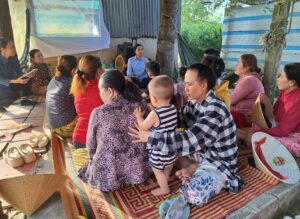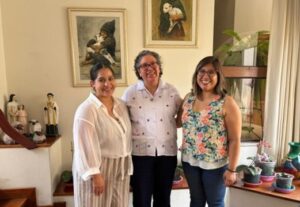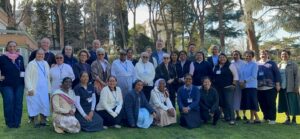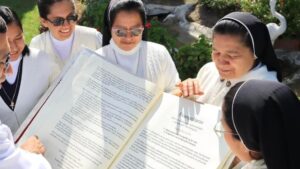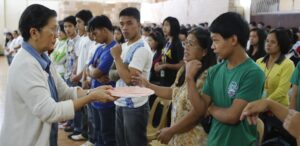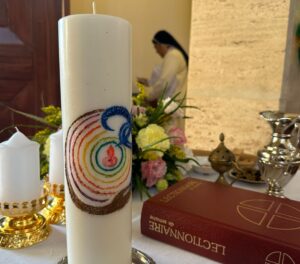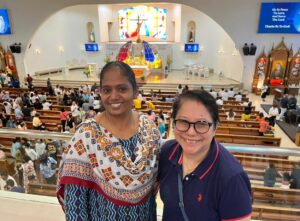El 21 de noviembre de 1983, cuatro hermanas del Buen Pastor se ahogaron en aguas infestadas de tiburones frente a la costa noreste de Mindanao, Filipinas, cuando la embarcación en la que viajaban volcó tras ser golpeada por una gran ola. De los más de 400 pasajeros a bordo, solo 184 sobrevivieron. Muchos de ellos contaron cómo vieron a las hermanas repartir chalecos salvavidas, ayudar a los niños a ponérselos e indicar a los pasajeros cómo llegar a las balsas salvavidas, instándoles a abandonar el barco que se hundía, todo ello mientras rezaban. Se las vio por última vez con niños pequeños en brazos, mientras hacían la ofrenda definitiva de sus vidas para salvar y consolar a los demás. En el 42.º aniversario de aquel fatídico suceso, la hermana Rosemary Bacaltos recuerda el día en que recibió la noticia.
"Cuando la hermana Mary Natividad y el consejo provincial en el que yo servía recibimos la impactante noticia de las cuatro hermanas que viajaban en el MV Dona Cassandra, no queríamos creerlo y esperábamos desesperadamente que no estuvieran entre los fallecidos, pero las operaciones de búsqueda y rescate no encontraron a nuestras hermanas entre los sobrevivientes.
Las cuatro hermanas habían reservado un viaje en barco a la ciudad de Cebú para asistir a un retiro en nuestro convento de Banawa. La salida estaba prevista para la tarde del 20 de noviembre, pero no pudieron zarpar debido a una fuerte tormenta. Conscientes del peligro que entrañaba viajar por mar, algunas de las hermanas y sacerdotes les aconsejaron que viajaran en avión, pero las hermanas se negaron a abandonar a los laicos, que también habían reservado plaza en el barco, entre los que se encontraban agricultores, trabajadores y familias.
Las hermanas Mary Consuello Chuidian, Mary Conception Conti y Mary Catherine Loreto eran miembros de la comunidad Reach Out en la ciudad de Davao, que solo contaba con cuatro miembros. La hermana Mary Josephine Bacaltos, que se enteró más tarde del hundimiento del Cassandra y de las cuatro hermanas, tuvo una premonición.
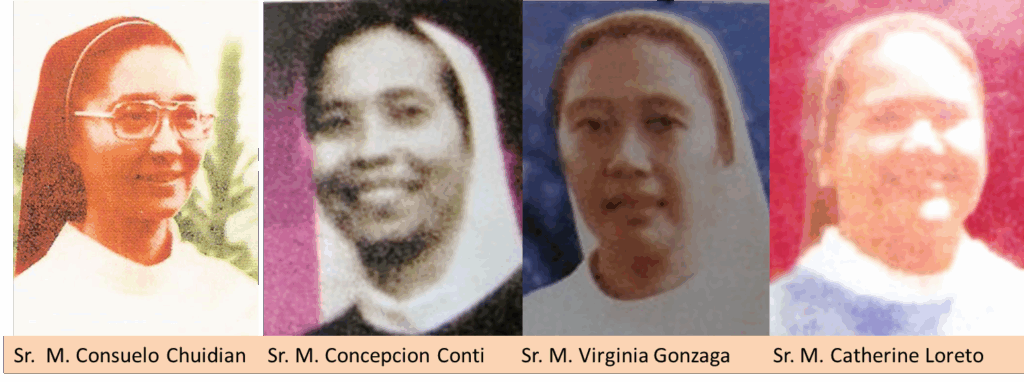
Their friend and benefactor, Edith Yap, regularly brought red roses to the community on November 21 for the Feast of the Presentation of Our Lady. That particular day, she unsuccessfully searched the flower shops and the markets for red roses, but finding none, she bought white roses and brought these to Reach Out. When Edith explained this to Sr. Mary Josephine, she saw it as an omen and felt apprehensive and anxious about the four sisters. Later, upon receiving the news, she was unconsolable, saying how she was due to travel with the sisters to Cebu City, but she gave up her space for Sr. Mary Catherine, who so dearly wanted to attend the retreat.
La Hna. Mary Consuelo y la Hna. Mary Conception participaron activamente en el Grupo de Trabajo para los Detenidos de la Asociación de Superiores Religiosos Mayores de Filipinas en Davao. Se trataba de una labor arriesgada y peligrosa durante los años de la ley marcial de la dictadura de Marcos, en los que los militares tomaron medidas drásticas contra los implicados, incluidos sacerdotes y religiosas. Reach Out era uno de los refugios seguros para los clandestinos y ya figuraba en la “lista de vigilancia” del ejército.
La Hna. Mary Virginia Gonzaga estaba en su primer año como líder de la comunidad en Sapad, Lanao del Norte, una ciudad con un alcalde musulmán y una población mixta de cristianos y musulmanes. La Fundación Sapad, creada en 1982 como misión rural para hermanas en formación temporal, comenzó con cuatro hermanas que se enfrentaban a un peligro constante en medio del conflicto armado, incluyendo frecuentes bombardeos sobre la ciudad y un presunto intento de secuestro de la hermana Mary Rosalinda Maglana, médica. Vivían en un frágil convento de bambú y nipa, y a menudo dormían en el suelo de cemento durante los ataques y dependían de los vecinos, que les advertían de las amenazas, vigilaban la zona por la noche e incluso colgaban la campana de la iglesia dentro del convento para protegerse. Aunque el obispo Fernando Capalla les ofreció la opción de marcharse debido al peligro, las hermanas decidieron quedarse, incluida la hermana Mary Virginia Gonzaga, que falleció trágicamente con el hundimiento del barco.''
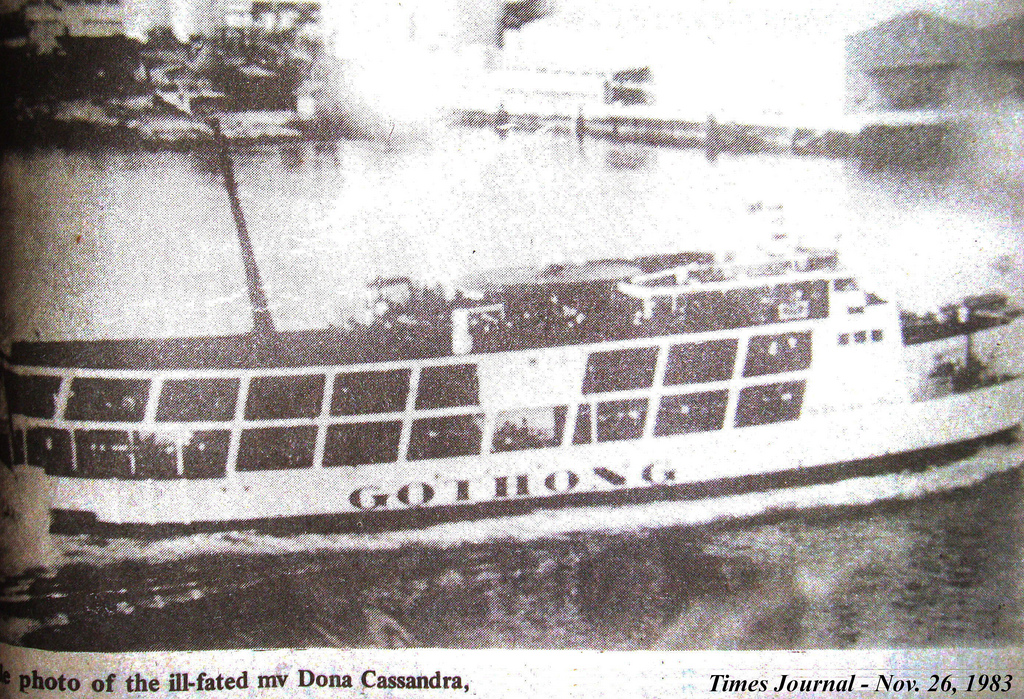
Días después del suceso, el 25 de noviembre de 1983, el sacerdote jesuita Eduardo Hontiveros compuso una canción en honor a los mártires de Cassandra (escúchala a continuación).
Dieciséis años después de la terrible tragedia, las cuatro hermanas fueron homenajeadas por la Fundación Bantayog ng Mga Bayani el 7 de diciembre de 1999 como mártires y heroínas por su heroísmo y dedicación a la justicia. Sus nombres están inscritos en el Muro del Recuerdo, con las siguientes palabras:
"Por contribuir al movimiento de protesta contra la dictadura de Marcos y los abusos contra los derechos humanos, como parlamentarios callejeros y superiores religiosos que dirigían y aplicaban programas de educación, salud, rehabilitación y justicia, tanto a través de
Por abandonar la seguridad y la comodidad de su hogar y convento para trabajar como misioneras rurales entre agricultores pobres, pueblos indígenas y musulmanes en zonas remotas de Mindanao, convirtiéndose así en testigos activos de la misión de la Iglesia de servir a los pobres, los desfavorecidos y los oprimidos en el momento álgido de la represión estatal contra la Iglesia.''
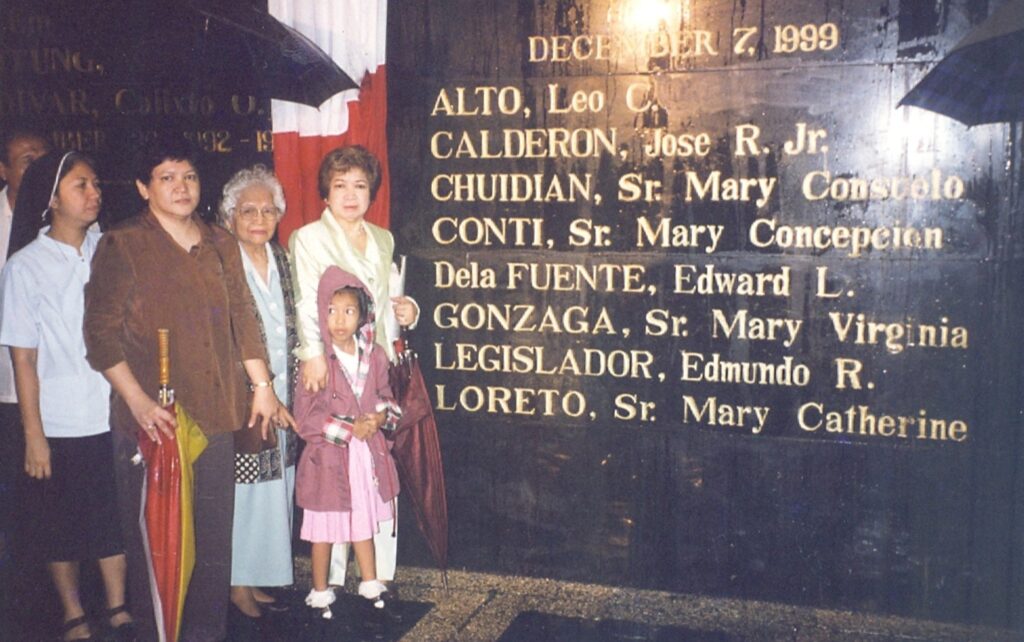
Su legado sigue siendo un poderoso recordatorio de lo que significa servir con amor hasta el final.
Para obtener más información sobre la Misión del Buen Pastor en Filipinas, visite: www.goodshepherdsisters.info

